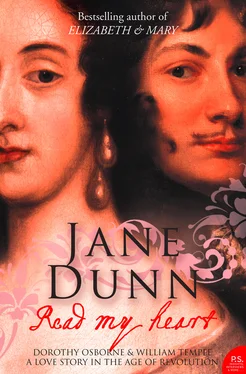The Osbornes at this time were members of a militant anti-establishment Church and Francis at least was educated at home, much of it in the challenging intellectual company of Brightman. When it came to choosing allegiances during the civil war, the eldest and evidently more conventional Peter fought doggedly and in vain for the royalists while the radicalised Francis chose to support parliament. It is interesting that Dorothy’s grandfather, a man so clearly sympathetic to an extreme wing of Puritanism, should have nurtured in his eldest son, Dorothy’s father, such resolute conservatism that he was prepared to sacrifice everything to support the king and maintain the status quo. These opposing family loyalties, complex and often painfully divisive as they were during this war, might have been one of the reasons for Francis’s rift with his family, mentioned in the preface to his book. There was also some dispute with his eldest brother over property that had to go to arbitration as Sir Peter lay dying.
Dorothy’s father was knighted in 1611 and he too held the family’s hereditary position in the treasury. His influential wife, Dorothy Danvers, and her family were responsible for changing his fortunes for ever. Her brother, the Earl of Danby, was created governor of Guernsey by Charles I in 1621 and at his instigation Sir Peter Osborne was made his lieutenant governor. In effect this meant that at the outbreak of civil war he would have to shoulder what turned out to be the thankless, prolonged and self-destructive ordeal of defending for the king Castle Cornet, the island’s principal fort.
Dorothy’s mother, Lady Osborne, was the youngest daughter of Sir John Danvers of Dauntsey in Wiltshire, whom John Aubrey * described as ‘a most beautifull and good and even-tempered person’. 1 Sir John’s wife, Dorothy’s grandmother, was Elizabeth Danvers † with whom he had nine children who survived to adulthood. She was an even more remarkable person, described by Aubrey as very beautiful, with some Italian blood, and clever too. Knowing Chaucer off by heart she was ‘A great Politician; great witt and spirit but revengefull: knew how to manage her estate as well as any man’, 2 with a jeweller’s knowledge and eye for gems and fine jewellery. She lived into her late seventies, if not her eighties, long enough to see her granddaughter Dorothy born. Women like her made no mark on the grand tide of history, leaving just a ripple in a family memoir or contemporary’s diary. Mothers and grandmothers were historically considered of note only in relation to their connections with others, and those usually male. Absent from the nation’s history, even in the stories of their families they seldom featured as individuals whose character and talents were worth memorialising, unless they took up the pen themselves. But their qualities lived on in their descendants.
Both Dorothy’s mother and grandmother came from more adventurous and spirited stock than the Osbornes’ solid pragmatic line. Daughters share not only the genetic inheritance of their brothers but, in early childhood at least, the family circumstances and ethos too. The sexes usually were separated later by expectations, education and opportunity, but the girls were just as much participants in the experiences of their childhood, the personalities that surrounded them and the animating spirit of the family. If brothers were educated at home then part of that education at least became accessible to any willing and able sister. The intellectual and personal qualities that distinguished the men, however, were more likely expressed in their sisters’ lives domestically and obliquely.
Dorothy’s mother had three remarkable brothers. She and her youngest sister Lady Gargrave might well have been remarkable too if they had been allowed to express themselves on a wider stage, the one becoming a resourceful melancholic and the other a forceful busybody. These three brothers all lived adventurous and boldly individual lives, all in the public eye, and suffered dramatically opposing fates. As uncles to Dorothy and brothers to her mother, their characters and experiences, and the family stories about them, were part of what made Dorothy Osborne’s own life and character what they were. She even, along with her family, spent some time living in the house of the youngest uncle in Chelsea in London.
Her eldest uncle, Sir Charles Danvers, was a soldier and man of action. Born in 1568 at the heart of Elizabeth I’s reign, he could have made a great career for himself in that world of swaggering and ambitious men. At barely twenty years old, he was knighted by his commander for courageous service in the Netherlands. Unfortunately he was later implicated in the murder, by his brother Henry, of a Wiltshire neighbour, and both had to flee as outlaws to France, where they came to the notice of the French king Henri IV, who, along with some Danvers sympathisers from their own country, petitioned Elizabeth I and William Cecil for a pardon. According to John Aubrey, also born in Wiltshire with a Danvers grandmother of his own, Lady Elizabeth Danvers, Dorothy’s formidable grandmother, having been widowed in her forties, then married Queen Elizabeth’s cousin Sir Edmund Carey, * himself only ten years older than her eldest son, specifically to expedite her sons’ pardons.
When he eventually returned to England in 1598, Sir Charles’s gratitude and loyalty to the Earl of Southampton, who had come to his aid and offered him refuge after the murder, led him into the ill-fated Essex Plot against their queen. When this was discovered he admitted all and was beheaded for treason in 1601, still only in his early thirties. This happened two decades before Dorothy’s birth, but Sir Charles Danvers was the eldest son and heir and the stain of treason marked a family for generations, laying waste to their fortunes in the process.
Dorothy’s next uncle, Henry, the perpetrator of the original murder, was born in 1573. He was to be raised to great heights as the Earl of Danby and would die in 1644 ‘full of honours, wounds, and dais’ at the considerable age of seventy. He was already a middle-aged man when Dorothy was born. Like his elder brother he showed precocious military leadership and valour. He was commander of a company of infantry by the age of eighteen and knighted after the Siege of Rouen in 1591 when he was only nineteen. He was twenty-one when, involved in a neighbourly dispute, he fired the fatal shot that killed Henry Long and branded him a murderer. This scandal and resulting exile of both brothers devastated the family, and was the fatal blow for their gentle father. Aubrey wrote how he had been particularly affected, ‘his sonnes’ sad accident brake his heart’, 3 and in fact Sir John died only two months later in 1594, without further contact with his eldest exiled sons, or any intimation of the adventures and celebrity that awaited them. Sir Henry’s outlawry was reversed eventually in 1604, but by then his father had been dead for ten years, his mother had married again and his elder brother Charles had died the ignominious death of a traitor.
More honours were heaped on Sir Henry Danvers’s head. At the end of Elizabeth’s reign he was made sergeant-major-general in Ireland, James I created him Baron Danvers of Dauntsey for his valiant service there and Charles I made him Earl of Danby in 1626. Aubrey described him as having ‘a magnificent and munificent Spirit’. He was tall and lean, ‘sedate and solid … a great Improver of his Estate, to eleaven thousand pounds per annum at the least, neer twelve. * A great Oeconomist’. 4 In 1621 he had been awarded the governorship of the Isle of Guernsey for life but when required to do something to defend the island appeared to find this honour rather less attractive and somewhat beneath his dignity: ‘[Danby] thinks it not for the king’s honour, nor suitable to his own reputation, that he, who was appointed general against anticipated foreign invaders in Ireland, should go to Guernsey to be shut up in a castle’. 5 When civil war loomed, this poisoned chalice was passed to his brother-in-law, Dorothy’s father, Sir Peter Osborne, whose dogged loyalty to the king and defence of the said castle cost him his health, his fortune and possibly hastened the death of his wife.
Читать дальше












